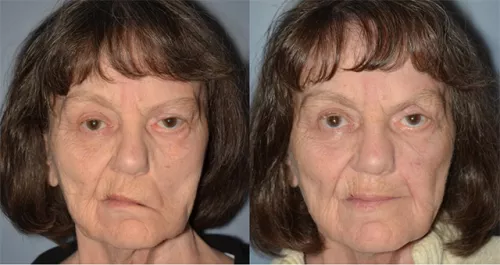Seventy-year old Barbara Couillard of Templeton faced life-threatening cancer of the parotid gland – one of the salivary glands - back in 2019. The initial surgery involved removal of the parotid gland, lymph nodes in the neck and part of the facial nerve that controls movement of the face. While Barbara’s life was saved, she found the side effects of the surgery staggering.
“After the surgery, my nose was pushed over to the right,” recalls Barbara. “I was having trouble breathing. And I had to be so careful not to choke when I ate, because the entire left side of my mouth was paralyzed.”
Barbara’s surgeon, Dr. Jeremiah Tracy, who specializes in head and neck cancer surgeries at Tufts Medical Center, referred her to Dr. Alexander Marston, a Facial Plastic & Reconstructive Surgeon at Tufts Medical Center’s Otolaryngology-Head and Neck Surgery Department. Dr. Marston works as a member of the multi-disciplinary Facial Nerve Paralysis Team that helps patients with facial weakness and paralysis that can result most commonly from Bell’s Palsy, but also cancer.
Dr. Marston explains that the facial nerve runs right through the area where her cancer was located. While many of the cancers in this area tend to be benign, Barbara’s was malignant which meant it grew more aggressively and required a larger surgery. Her surgery gravely affected this area and left her without nerve input into the facial muscles on one side of her face.
“Our group was created to help patients just like Barbara,” said Dr. Marston. “Facial paralysis is a debilitating condition that can impact the appearance of the face, inhibit the expression of emotions, make eating and drinking difficult, cause nasal congestion, lead to obstructed vision and possible eye irritation. This was the case with Barbara as she experienced many difficulties from facial paralysis. A drooping eyebrow led to obstruction of her vision. Her nasal breathing was blocked due to narrowing of one nostril. She struggled to eat and drink from a lack of movement of her lips. I knew we could help her have a better quality of life.”
It would be almost two full years after her initial surgery before Barbara was strong enough to be a candidate for reconstructive work.
“I first met Dr. Marston when I was in my surgeon’s office,” recalls Barbara. “I was very hesitant to have another surgery and this would be a big one. But Dr. Marston explained everything to me. By this point, I had been to hell and back, but he assured me that he felt he could help me, so I put my faith and trust in him and I am so grateful that I did.”
“This past summer we did a procedure to improve the asymmetry and function of her face. In order to do this, we borrowed fascia from her leg,” explained Dr. Marston. “It’s a redundant piece of tissue that was moved to her face to lift and suspend the sagging tissues around the mouth and nose. We also did a brow lift and tightened her lower eyelid. While this surgery doesn’t restore movement of the facial muscles, we hoped to improve her vision, nasal breathing and ability to eat and drink.”
The improvements are easy to see in these before and after photographs.

Barbara says friends and family told her they immediately saw a difference in her appearance, but it would take her some time before she could find the courage to look at herself in the mirror.
My nose and my face are more together,” said Barbara. “My breathing has improved dramatically and it is also so much easier for me to eat. I still have a little trouble talking, but that continues to improve. I am so grateful to my team at Tufts MC and to Dr. Marston. He restored a quality of life I never thought I would have again.”
You can request an appointment and consultation with Dr. Marston here or by calling 617.636.8711.